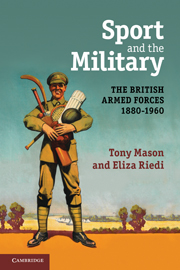Book contents
- Frontmatter
- Contents
- List of illustrations
- Acknowledgements
- Introduction
- 1 The growth of service sport, 1880–1914
- 2 Officer sports and their critics, 1880–1914
- 3 Sport in the Great War
- 4 The amateur era, 1919–39
- 5 Soldiers, sailors and civilians
- 6 A different kind of war
- 7 The national service years: the summit of military sport?
- Conclusion
- Select bibliography
- Index
7 - The national service years: the summit of military sport?
Published online by Cambridge University Press: 05 December 2012
- Frontmatter
- Contents
- List of illustrations
- Acknowledgements
- Introduction
- 1 The growth of service sport, 1880–1914
- 2 Officer sports and their critics, 1880–1914
- 3 Sport in the Great War
- 4 The amateur era, 1919–39
- 5 Soldiers, sailors and civilians
- 6 A different kind of war
- 7 The national service years: the summit of military sport?
- Conclusion
- Select bibliography
- Index
Summary
There was one certain way to escape the routine of the Army and that was to excel at sports. Anyone who reached a high standard at football or rugby, anyone who could run or jump and especially anyone who could box, was assured of a few short cuts … In the British Army, squad competes against squad and regiment competes against regiment. The Army competes against the Navy and Air Force and the Combined Services compete against the World – or they did in those days. The horizons of an Army sportsman knew no bounds.
Tony Thorne, Brasso, Blanco and Bull (London: Robinson, 2000), pp. 50–1.It will be clear by now that sport in its many forms had become a well-established part of service life well before the end of the Second World War. Its importance was to be underlined when conscription was reintroduced by the National Service Act of 1947. The loss of India had not only diminished the size of the Empire but deprived the British armed services of a large pool of manpower. As the British government had no intention of giving up the rest of the Empire, sailors, soldiers and airmen were needed to man bases in many areas of the world. The 1947 Act stipulated that all males between the ages of eighteen and twenty-six would serve for one year. The rapid onset of the Cold War changed the context of national service with first the crisis over Berlin in 1948 and then the outbreak of war in Korea in 1950 emphasising the need for further increases in the manpower of the armed forces. The government agreed to extend the period of service to eighteen months in November 1948; in September 1950 it was increased to two years. By the time of the Festival of Britain in 1951, half of the manpower of the British army was made up of national servicemen. Conscription could have become a permanent part of the British way of life as it was in many other countries such as Belgium, France and Italy. That it did not was probably mainly due to the development of nuclear weapons with Britain relying first on the American deterrent and then on their own atomic bomb and the V-Bomber force to deliver it after 1955.
- Type
- Chapter
- Information
- Sport and the MilitaryThe British Armed Forces 1880–1960, pp. 217 - 252Publisher: Cambridge University PressPrint publication year: 2010



